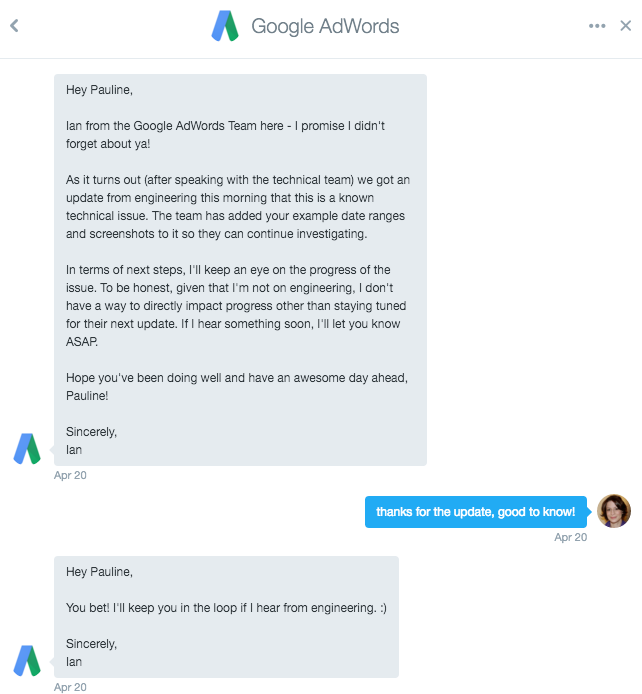One of the great things about working for a PPC agency is that you get to learn from, and share your expertise with, other likeminded PPC pros.
(And let’s face it, lengthy discussions of AdWords and PPC strategy doesn’t make for scintillating dinner party conversation. Thank goodness we have each other!)
And because all of us on the Group Twenty Seven team have our heads deep in paid search all the time, we sometimes uncover things in house marketing teams miss.
(And—in this case—something the engineers at Google AdWords missed!).

The AdWords Error You Might Have Missed
I was working on a client account and comparing results between AdWords and Google Analytics. Then I noticed something strange. See if you can spot it.
Here are the report settings in Google Analytics:

Here are the report settings over the same date range in AdWords:

See the difference?
The AdWords calendar has a glitch.
In our example, the “compare to” date range in AdWords is January 11 to March 1. But in Google Analytics, it’s January 10 to March 1.
Basically, the AdWords calendar doesn’t take into account the 2016 leap year.
AdWords Responds
I immediately informed the Group Twenty Seven team of my findings. And Pauline Jakober put the question to AdWords:

To Google’s credit, an AdWords rep got back to her straight away. After a bit of back and forth to clarify the situation, they eventually responded with this:

Why This is a Big Deal
While this issue might seem minor—what difference can a day or two make?—it’s not, for several reasons:
1. Misleading data
At Group Twenty Seven, we use data to guide the management of our client accounts. So any misleading data is a problem.
And this error could result in misleading data.
2. Error exacerbated by shorter date ranges
This misleading data becomes an even bigger problem when analyzing shorter date ranges (such as a week or two). When you’re dealing with only a handful of days, plus or minus a day can make a real difference.
This is especially true with B2B companies if the day in question lands on a weekend, when business tends to fall off.
3. This isn’t a one-off
Comparing data sets is something we do as PPC pros all the time. This isn’t an occasional exercise. So having comparable and reliable data sets is critical.
And if the issue isn’t fixed—and our AdWords rep made no promise that it would be—will we need to remember this error four years from now when the next leap year rolls around?
A Few Conclusions
We can take away a couple of lessons from this situation:
1. You have to give some credit to AdWords
It’s rather impressive that a huge monolithic company like Google takes our questions seriously and gets back to us quickly—even if (as a PPC agency) we’re something of a constant, nagging thorn in their side.
Yes, it’d be nice if we knew for certain that the issue would be fixed and when. But at least we know they’re aware of it.
We do appreciate that communication lines are (and remain) open.
2. There’s no substitute for a dedicated PPC team with eyes on your campaign
Unless you’re dealing with AdWords every day, all day, it’s easy to miss these kinds of errors. And that’s why there’s no substitute for having a dedicated PPC team working on your account.
At Group Twenty Seven, PPC is all we do. And that brings real advantages to your marketing team and your business.






